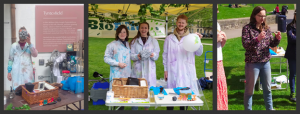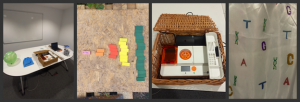Red blood cells that have been grown in a laboratory have now been transfused into another person in a world first clinical trial led by a UK team including University of Bristol researchers.
The manufactured blood cells were grown from stem cells from donors. The red cells were then transfused into volunteers in the RESTORE randomised controlled clinical trial.
This is the first time in the world that red blood cells that have been grown in a laboratory have been given to another person as part of a trial into blood transfusion.
If proved safe and effective, manufactured blood cells could in time revolutionise treatments for people with blood disorders such as sickle cell and rare blood types. It can be difficult to find enough well-matched donated blood for some people with these disorders.
The RESTORE trial is a joint research initiative by NHS Blood and Transplant (NHSBT) and the University of Bristol, working with the University of Cambridge, Guy’s and St Thomas’ NHS Foundation Trust, NIHR Cambridge Clinical Research Facility, and Cambridge University Hospitals NHS Foundation Trust. It is part-funded by a National Institute for Health and Care Research grant.
The trial is studying the lifespan of the lab grown cells compared with infusions of standard red blood cells from the same donor. The lab-grown blood cells are all fresh, so the trial team expect them to perform better than a similar transfusion of standard donated red cells, which contains cells of varying ages.
Additionally, if manufactured cells last longer in the body, patients who regularly need blood may not need transfusions as often. That would reduce iron overload from frequent blood transfusions, which can lead to serious complications.
The trial is the first step towards making lab grown red blood cells available as a future clinical product. For the foreseeable future, manufactured cells could only be used for a very small number of patients with very complex transfusions needs. NHSBT continues to rely on the generosity of donors.
Two people have so far been transfused with the lab-grown red cells. They were closely monitored and no untoward side effects were reported. They are well and healthy. The identities of participants infused so far are not currently being released, to help keep the trial ‘blinded’.
The amount of lab grown cells being infused varies but is around 5-10mls – about one to two teaspoons.
Donors were recruited from NHSBT’s blood donor base. They donated blood to the trial and stem cells were separated out from their blood. These stem cells were then grown to produce red blood cells in a laboratory at NHS Blood and Transplant’s Advanced Therapies Unit in Bristol. The recipients of the blood were recruited from healthy members of the National Institute for Health and Care Research (NIHR) BioResource.
A minimum of ten participants will receive two mini transfusions at least four months apart, one of standard donated red cells and one of lab grown red cells, to find out if the young red blood cells made in the laboratory last longer than cells made in the body.
Further trials are needed before clinical use, but this research marks a significant step in using lab grown red blood cells to improve treatment for patients with rare blood types or people with complex transfusion needs.
Co-Chief Investigator Ashley Toye, Professor of Cell Biology at the University of Bristol and Director of the NIHR Blood and Transplant Unit in red cell products, said: “This challenging and exciting trial is a huge stepping stone for manufacturing blood from stem cells. This is the first-time lab grown blood from an allogeneic donor has been transfused and we are excited to see how well the cells perform at the end of the clinical trial.”
Co-Chief Investigator Cedric Ghevaert, Professor in Transfusion Medicine and Consultant Haematologist the University of Cambridge and NHS Blood and Transplant, said: “We hope our lab grown red blood cells will last longer than those that come from blood donors. If our trial, the first such in the world, is successful, it will mean that patients who currently require regular long-term blood transfusions will need fewer transfusions in future, helping transform their care.”
Dr Rebecca Cardigan, Head of Component Development NHS Blood and Transplant and Affiliated Lecturer at the University of Cambridge said: “It’s really fantastic that we are now able to grow enough red cells to medical grade to allow this trial to commence, we are really looking forward to seeing the results and whether they perform better than standard red cells.”
John James OBE, Chief Executive of the Sickle Cell Society, said: “This research offers real hope for those difficult to transfuse sickle cell patients who have developed antibodies against most donor blood types. However, we should remember that the NHS still needs 250 blood donations every day to treat people with sickle cell and the figure is rising. The need for normal blood donations to provide the vast majority of blood transfusions will remain. We strongly encourage people with African and Caribbean heritage to keep registering as blood donors and start giving blood regularly.”
Dr Farrukh Shah, Medical Director of Transfusion for NHS Blood and Transplant, said: “Patients who need regular or intermittent blood transfusions may result develop antibodies against minor blood groups which makes it harder to find donor blood which can be transfused without the risk of a potentially life-threatening reaction. This world leading research lays the groundwork for the manufacture of red blood cells that can safely be used to transfuse people with disorders like sickle cell. The need for normal blood donations to provide the vast majority of blood will remain. But the potential for this work to benefit hard to transfuse patients is very significant.”
The Bristol team’s work is highlighted in this Bristol BioDesign Institute research impact case study entitled: ‘Cultured red blood cells: a window into the future of transfusions and therapeutics‘.
(This press release was originally published by University of Bristol on 7 November 2022)
 Ben Hardy, a Research Associate in the School of Biochemistry at the University of Bristol, won a prize for his poster at the Synthetic Biology UK conference (7-8 November 2022).
Ben Hardy, a Research Associate in the School of Biochemistry at the University of Bristol, won a prize for his poster at the Synthetic Biology UK conference (7-8 November 2022).

 Zentraxa
Zentraxa


